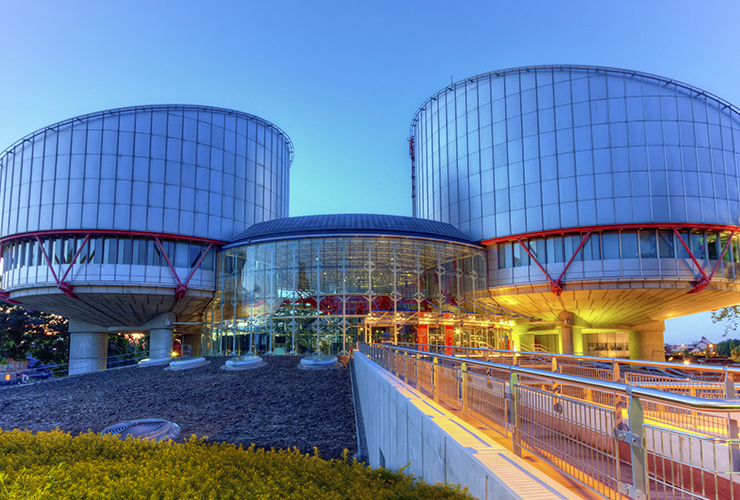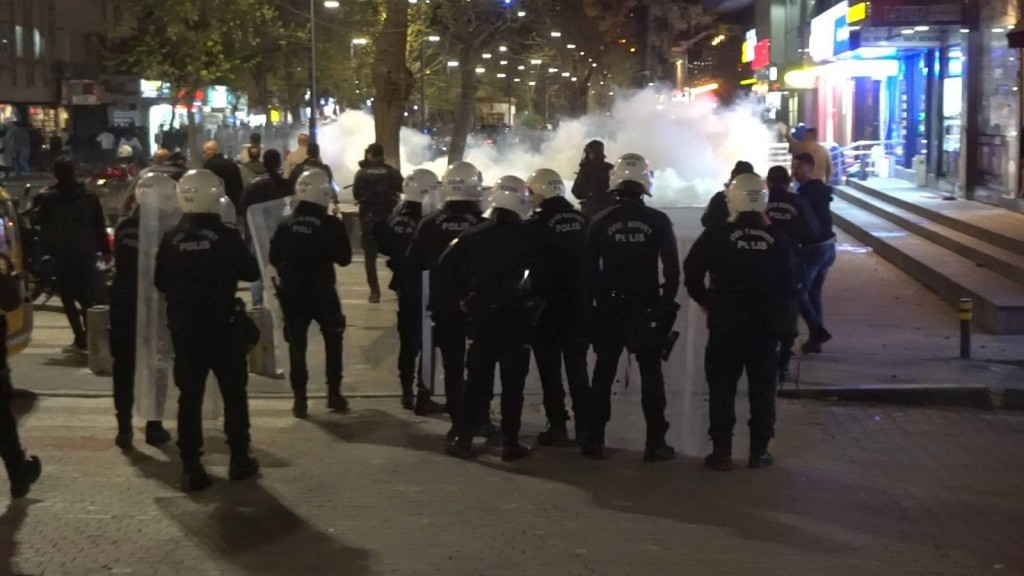In recent years numerous countries across Europe have experienced a decline in press freedom as governments increasingly turned to legal harassment, smear campaigns and online attacks to pressure independent media and journalists into silence.
In this climate, European journalists face many dangers in carrying out their work, from physical assaults and kidnapping, to death threats and, in extreme cases, assassination.
Due to the nature of their work in unearthing corruption and holding governments to account, others face arbitrary arrest, unfair court proceedings, unwarranted surveillance, or search and seizure operations.
In many countries across the continent, robust judicial systems ensure the media is protected against abuses of power, while effective police forces mean those carrying out physical attacks are brought to justice.
But in other states where the rule of law is weaker, officials and security services are less inclined to protect the rights of journalists and are often responsible for many media freedom violations themselves.
Even in highly democratic countries, complex legal questions regarding leaked information, whistle-blowers, source protection and mass surveillance by powerful intelligence agencies mean journalists have to be on their guard.
However, in Europe, if national jurisdictions fail at protecting fundamental rights, journalists have one other place to turn to in their search for justice and the fight against impunity: the European Court of Human Rights (ECtHR).
Formation and role
Created under the auspices of the Council of Europe, the ECtHR is a regional human rights judicial body based in Strasbourg dedicated to ruling on whether member states have violated the fundamental rights of its citizens.
The court is made up of a 650-strong team of lawyers and administrators led by an elected judge from each of the Council of Europe’s 47 member states, giving it jurisdiction over a continent of 740 million people.
For the last 60 years, the ECtHR has made judgements on tens of thousands of alleged violations of the European Convention on Human Rights (ECHR). These have led to important rulings in countries as diverse as Malta, Finland, Greece, Ukraine, Azerbaijan, Germany, Russia and Turkey.
Central to this work is its defence of key political and civic rights, including first and foremost, the right to life, a fair trial and freedom of thought, conscience and religion.
The Convention also prohibits torture, degrading treatment, forced labour, unlawful detention and discrimination and recognizes the respect to the right for private and family life and the protection of property.
Protecting journalist’s rights
For journalists, the most directly relevant article of the Convention is Article 10, which protects the right to freedom of expression, which is viewed by the court as “an essential basis of a democratic society”. Article 10 protects the “freedom to hold opinions and to receive and impart information and ideas without interference by public authority and regardless of frontiers”, thus establishing the foundation to protect the work of journalism and the media.
Other articles of the Convention also play an important role in protecting the rights of journalists. Article 5 protects the right to liberty and security, as well as protection from unlawful detention. Article 6 ensures that journalists receive a fair trial should they be charged with crimes. Journalists’ physical safety and integrity are protected by Article 2 (right to life), which requires states to safeguard the lives of those within its jurisdiction, and Article 3 (prohibition of torture and degrading treatment).
Journalists or media outlets who allege that their rights under the Convention have been violate can lodge an application with the ECtHR. Once admitted, cases are prioritised by severity, with those involving people in serious risk or serious systematic abuses considered first.
Crucially, to be taken up and heard in the ECtHR, a case must meet four criteria. First, the applicant must have exhausted all legal avenues at the national level (“exhaustion of domestic remedy”). Second, the application must file the case within six months after the final national court decision. Third, it must contain a complaint against a state party to the European Convention on Human Rights. And finally, applicants must have suffered a significant “disadvantage” in the violation of their rights.
If an application fails to meet any of these requirements, it will be declared inadmissible and cannot proceed any further. These strict conditions mean that each year only around 300 cases reach a verdict. The vast majority of cases never progress that far.
Landmark decisions
For those that do however, the case is taken up by ECtHR committees who often work for an average of four years to gather evidence and prepare a decision for the judges to rule on. Though progress can be slow, a final judgement by the court can have significant consequences on states, which are bound by an “unequivocal legal obligation” set forth under Article 46 of the Convention, to obey the decision.
Depending on the ruling, abiding by the ECtHR’s judgment may mean taking steps to end the violation, paying damages to the aggrieved party, or ensuring similar violations do not occur in the future. Such high-profile decisions can prove an embarrassing defeat for governments and the ultimate legal recourse for applicants.
In Europe, some states end up on the wrong side of the Court more than others. The worst two offenders are Turkey and Russia. Since recognising the jurisdiction of the ECtHR, Turkey has been found to have violated the Convention 3,224 times, while Russia has been found has violated the convention 2,551 times.
This trend has continued over the last few years. In 2019, of the 113 judgements reached regarding Turkey, 96 found at least one violation of the European Convention of Human Right. Freedom of expression was the most commonly breached right in Turkish cases, at 30%.
In 2019, Russia also had over 15,000 pending cases, while Turkey had over 9,200, according to the ECtHR’s annual report. These two countries alone are responsible for more than 40% of all the court’s cases. In recent years, this has led to criticism that for many applications in these countries, pursuing cases at the ECtHR has become a dead end.
Rulings on media freedom
Despite evolving challenges, in the 60 years of its existence the ECtHR has reached well over 10,000 judgments. The majority of these have been on the right to a fair trial, allegations of torture and inhuman or degrading treatment. In 2019, for example, 25% of all judgements related to the right to a fair trial; 19% involved torture or degrading treatment; and 15% concerned the right to liberty and security.
Many of these cases have also been brought by media freedom advocates, media publications and individual journalists or their families. Over the years, this has led to many landmark rulings on press freedom, which have solidified the press’s role as public watchdog and established key principles of media law such as requiring public officials to accept greater scrutiny. These principles are now essential elements of national-level jurisprudence and have led to a major expansion of journalists’ basic rights.
The Court’s rulings on freedom of expression have covered a wide range of issues, ranging from defamation to the protection of sources. In 2008 for example, the court ruled in favour of a Dutch journalist who was detained for over two weeks by police in an attempt to get him to reveal his source for two articles he had written for a newspaper concerning a criminal investigation into arms trafficking.
In a major victory for media freedom in 2018, the court ruled that the UK government’s mass surveillance by the intelligence agencies through the Government Communications Head Quarters, GCHQ, without adequate safeguards to protect the freedom of the press, was unlawful. The case, brought by the Bureau of Investigative Journalism, forced the government to rewrite the law on how security and intelligence services were able to look at and use journalists’ confidential communications and material.
Other rulings have focused on disproportionate searches of newsrooms by police. In 2012 for example, the court ruled the French state violated Article 10 in its search on the offices of the daily newspaper Midi Libre when it was investigating how journalists had obtained a copy of a confidential draft report.
In another important case, in 2018 the ECtHR ruled that Russian authorities had violated Article 10 when customs authorities examined and copied the data contained on photojournalist Yuri Ivaschenko’s laptop after he returned from a work trip to the de facto sovereign state of Abkhazia in Georgia.
In rarer cases, the ECtHR has ruled on violations of a journalist’s right to life. In 2005, for example, the court found Ukraine had violated Article 2 of the Convention following the authorities’ failure to protect the life of Georgiy Gongadze, a well-known journalist covering political and corruption stories. In a case brought against the state by his wife, the ECtHR ruled that during the investigation, the authorities were more preoccupied with proving the lack of involvement of high-level state officials in the case, than discovering the truth about Gongadze’s disappearance and death.
Many cases have also focused on Turkey, which has been found by the ECtHR to have breached Article 10 more times than any other European country. Between 1989 and 2019, the court heard 356 different cases involving alleged breaches of freedom of expression in Turkey. In 2019 alone, the court made judgements on 35 different cases of breaches of Article 10 in Turkey. Despite this, the court has also been criticized for failing to act quickly enough on a wave of similar cases from Turkey following the failed military coup in 2016, the aftermath of which saw mass jailings of journalists without due process and based on groundless, politicized accusations of involvement in terrorism.
The comparatively small number of cases in which the court has ruled since 2016 nevertheless carry significance. In 2018 for example, the ECtHR judged that Turkey had breached Articles 5 and 10 in its arrest and continued detention of Şahin Alpay, a long-time journalist at daily newspaper Zaman, on charges of being a member of a banned terrorist organization. The ECtHR has ruled on several similar cases in the past four years, including high-profile journalists such as Mehmet Hasan Altan and his brother Ahmet Hüsrev Altan.
In October 2019 the International Press Institute led a third-party intervention of 10 civil society organizations in the case of the Turkish-Kurdish journalist Idris Sayılğan, who had been held in pre-trial detention for 26 months before being sentenced in January 2019 to over eight years for alleged membership of a terror organization. Sayılğan’s case has been pending before the Turkish Constitutional Court since July 2018 and so had not formally exhausted domestic remedy.
IPI argued that the ECtHR should take up Sayılğan’s case nevertheless because Turkey’s judicial system could not provide a domestic remedy, noting in particular the undue length of time for the constitutional court to rule and serious concerns regarding the independence of Turkey’s judiciary. On November 26, one week prior to the deadline for Turkey’s response to the ECtHR, Sayılğan was released without warning in what is widely interpreted as a pre-emptive move by Turkey to avoid criticism from the ECtHR. While legally unsatisfactory if it denies a positive judgement, this nevertheless illustrates the power of the court to influence proceedings for the better without having to rule on every case.



